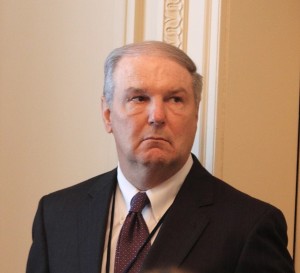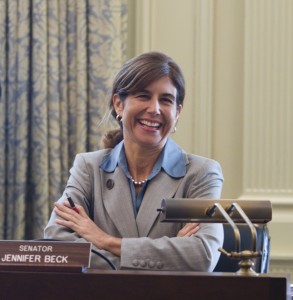- Hal Bozarth, lobbyist for NJ Chemistry Council, pleads for liability relief before Senate Environment Committee (July 15, 2010)
[here’s a concrete example of some of that huge liability – ABC News: Pollution Problems Linked To Bayway Refinery
Update 7/20/10 – read NJ Spotlight story: Against Backdrop of Gulf Oil Spill, State Senate Looks to Boost Liability to $1 Billion – end updates]
There was extraordinarily significant and controversial testimony in Trenton on Thursday, as oil and chemical industry lobbyists desperately scrambled to beat back proposed bi-partisan legislation to increase their liability from the currently capped value of $50 million to $1 billion (click to read the bill, S2108 Smith (D-Midddlesex)/Bateman (R-Somerset).
The move by NJ legislators parallels a federal effort that has gotten much attention:
Senate panel removes spill liability cap; passes Menendez bill
WASHINGTON, DC, July 1 — The US Senate Environment and Public Works Committee passed Sen. Robert Menendez’ (D-NJ) bill to increase the offshore oil spill liability limit, with an amendment proposed by chairwoman Barbara Boxer (D-Calif.) to eliminate the liability cap for a party deemed responsible for an offshore spill.
“The catastrophe in the Gulf of Mexico makes it clear that the companies responsible must be held fully accountable for the damages they cause to the economy and the environment,” Boxer said following the voice vote.
Menendez’ original bill, S. 3305, would have raised the liability limit established under the 1990 Oil Pollution Act to $10 billion from $75 million. The amended measure now heads to the full Senate.
Yet remarkably, there was absolutely no news coverage of this issue or the Trenton action (see related Star Ledger July 9 editorial Oil minefield poses future risks).

To listen to Jim Benton, head of the NJ Petroleum Council cry crocodile tears, about the “very sad and tragic” Gulf blowout; to watch Hal Bozarth of the NJ Chemistry Council squirm, and to hear Committee Chair Bob Smith describe oil industry DC lobbyists opposing the Menendez bill as “forces of evil” – were historical moments well worth the price of admission!
You can listen to the testimony by clicking on this link and going to July 15 Senate Environment Committee hearing link. The testimony on the bill begins at time 30 minutes and runs for about 40 minutes (and don’t miss my testimony, which starts just past time 1 hour, 8 minutes!)
The 1976 NJ Spill Compensation and Control Act has a $50 million liability cap that was set 34 years ago. Obviously, regardless of the Gulf blowout, that paltry cap needs to increase or, better yet be eliminated, in light of new knowledge about oil and chemical industry facility risks and current economic conditions.
Aside from the Gulf blowout, since then, there have been major chemical and oil accidents and spills in NJ whose cleanup costs alone exceed the $50 million cap.
Those cleanup costs do NOT include huge costs for restoration and compensation for natural resource damages, replacement of public water supplies, the costs of treating water supplies that have been poisoned, or foregone economic development opportunities.
These costs typically exceed cleanup costs, sometimes by orders of magnitude – and are often paid for by local property taxpayers, particularity for municipal water systems.
The cleanup costs also do not include the costs of property value diminution, as existing real estate values are greatly reduced by pollution (think of vapor intrusion in Pompton Lakes NJ), and new development potential and economic opportunities are constrained by polluted land and/or condemned by polluted groundwater and lack of available clean water supplies needed to serve new development.
In addition, since 1976 when the $50 million cap was enacted, we have seen catastrophic chemical accidents, like Bhopal India, where thousands of people were killed as a result of a toxic chemical release.
According to US EPA, NJ has at least 15 chemical plants where an accidental release of extraordinarily hazardous chemicals could KILL over 100,000 people living nearby.
This is known euphemistically in the regulatory jargon as “off site consequence analysis”. Maps show the death zone around scores of NJ facilities. Â Not surprising, the maps of these “kill zones” are not disclosed to residents living in those death zone neighborhoods under a sham secrecy concern about terrorism.
As a ballpark measure to gauge the magnitude of that kind of lethal liability, consider the fact that airline liability typically exceeds $1 million per person killed in plane cashes. At $1 million per person killed by a chemical accident, that would amount to  a $100 BILLION liability for fatalities alone, an amount far short of the proposed $1 billion cap.
And this liability, while huge, does not consider all the real estate liability (how much would any impacted property be worth after a fatal chemical accident?). Evacuation of the death zone would trigger billions of additional liability (just think of a Bhopal, Times Beach, Missouri; Love Canal, NY; or Libby Montana in North Jersey and do the math).
According to sponsors, the Senate bill is intended to assure that NJ’s interests are protected in the remote and unlikely event that Gulf oil tarballs hit NJ beaches. The bill also might discourage off shore oil and gas drilling that might impact the NJ shore.
But far more significant and probable risks were discussed in testimony, from over 300 NJ based refineries, chemical plants, pipelines, and storage tanks.
In addition, for the first time, the issue of inadequate resources in the NJ Spill Fund and the need for an increase in the oil/chemical industry surcharge was broached – this too parallels a major national policy debate in Congress where NJ Senators Lautenberg and Menendez are leading the fight to reauthorize the federal Superfund tax. (see Star Ledger July 8 editorial “It’s time to reinstate the Superfund Tax“)
Many recognize that the federal Superfund progtram is broke and as a result sites are not being cleaned up. But few realize that NJ faces the same problem at the state level. The NJ Spill Fund surcharge has not been increased in many years and there is a huge deficit in terms of cleanup need.
At the oil/chemical industry lobbyists’ urging, the Committee amended the bill to apply only to off shore risks –

Senator Jennifer Beck (R-Monmouth) – works to narrow liability bill, as sought by oil and chemical industry lobbyists
I am shocked to report that Senator Beck (R-Monmouth) was carrying the water of the oil and chemcial industries. She effectively blocked release of the broader introduced version of the bill that would have applied to NJ land based facilities. Those land based facilities actually pose far greater risks than threats from NJ offshore operations (there are no offshore operations! Proposed oil/gas exploratory drilling off he Virginia shore is purely hypothetical, as are the low probability of gulf impacts). Plus, whatever happens on the land in NJ ends up in the ocean! Fundamental ecological principles: all things are inter-related!
The Committee is seeking input to quantify these risks for the next hearing, on August 23 – we urge citizens out there to weigh in with the Committee on this issue and assure that NJ’s interests – not the profits of the oil and chemical industries – are fully protected.
We will be following this issue closely and will soon post details on NJ based risks.

Pingback: maillot psg swarovski
Pingback: comprar replica camiseta real madrid
Pingback: germany olympic hockey jerseys
Pingback: dfb trikot 2012 damen ausw?rts
Pingback: maillot du portugal nouveau
Pingback: presentacion de la nueva camiseta del real madrid 2013
Pingback: ac milan gattuso shirt
Pingback: real madrid ronaldo shirt
Pingback: gr锟斤拷nes deutschland trikot frauen
Pingback: thauvin maillot du psg
Pingback: WolfeNotes.com » NJ Senate To Consider Bill To Further Weaken NJ Toxic Site Cleanup Laws
Pingback: WolfeNotes.com » The Corrupt Political Power Of The NJ Chemistry Council, NJ Petroleum Council, And Big Pharma Is Blocking Common Sense Land Use And Chemical Safety Protections
Pingback: WolfeNotes.com » East Palestine Toxic Train Derailment Disaster Exposes Flaws In NJ $50 Million Liability Cap